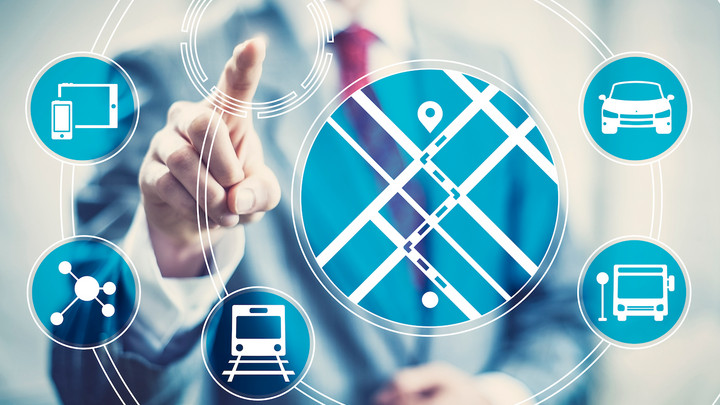Data as the Key to Connected Mobility
The Mobility Data Space, guided by the European cloud project Gaia-X, offers a foundation for furthering the digitalization of mobility, reports Tatjana Hein from the eco Association.

© Mikko Lemola|istockphoto.com
Data is arguably the most important raw material of the future and is the prerequisite for connected and autonomous mobility. Because without meaningful data and its availability, networking and innovative progress in the mobility sector is almost impossible.
Generating, utilizing, and making data available has enormous advantages for the mobility sector, such as:
- The improvement of traffic safety
- The increase in environmental efficiency - keyword: Sustainability
- The increase in economic efficiency
In creating the Mobility Data Space, a foundation for furthering the digitalization of mobility is being laid.
Mobility Data Space
It was already decided at the beginning of November 2019 at the Auto Summit that private and public mobility providers would jointly create a mobility data network by the end of 2021. To this end, both car manufacturers and local and long-distance transport operators should make the necessary data available quickly and also agree on a procedure.
The goal behind this is to accelerate progress in the digitalization of mobility as well as to foster research and development in the mobility sector. The German federal government is striving to reach a common understanding of data provision in this area among stakeholders from business, science, government, and consumer protection.
Implementation of the data network
acatech – the German National Academy of Science and Engineering has been commissioned to set up a holding and operating company to implement the data network. By April 2021, acatech intends to transfer the data space into a non-profit limited liability company (GmbH). Companies are to participate in this and invest in the data space, and the federal government is providing 18 million Euro for this purpose.
The system itself is to be operated by a private service provider, who is to be sought via tender to take over the system on 1 July.
So far, Volkswagen, Here Technologies, the mobility provider Free Now, Deutsche Bahn AG, the German Weather Service, the Federal Road Research Institute and the Hessian road construction authority Hessen mobil have been actively involved in setting up the data space.
In implementing the project, all companies and acatech are guided by the European cloud project Gaia-X. The data network is thus based on a decentralized solution so that everyone keeps their data on their own server and decides for themselves which data is released and who may use it, and under what conditions. In this way, data sovereignty would remain with the companies involved.
Challenges of a national data space
There are still some hurdles to overcome in order to create a national platform, which is to be extended to the European level in the future. This is because the project raises questions and problems that need to be clarified before the targeted regular operation from October 2021.
Data security
As a platform, the data space must guarantee the security of the data, and access to the data must be designed in accordance with data protection requirements. Common rules must be established to enable trusted data transaction
Voluntary data exchange
Data exchange can only function on a voluntary basis, and it is important to leave data sovereignty with the companies involved. The decision as to which data to make available must be left to the companies. However, the non-disclosure of useful data could be problematic. This is because the focus is on joint exchange to drive forward the digitalization of mobility in Germany as a country of cars.
Uniform storage formats
In order to make the data provided equally accessible to all participants, uniform storage formats should be agreed upon so that the data can all be made available in the same form and can then also be used accordingly.
Competitive neutrality
A common data space for mobility must be designed to be competitively neutral and must also be able to guarantee this neutrality in the long term. Financing in particular plays an important role here. A model that is acceptable to and understandable for the parties involved must be developed here.
Missing business models
At present, it is not yet clear which business models can be realized with the data or which new ones can be created. To be sure, some ideas have been floated so far, such as Audi’s plan to offer road hazard information directly from cars, or Daimler’s idea of relaying data on road conditions via the network. But none of the players wanted to comment concretely so far. Without concretized approaches and application possibilities, a lot of idle data could be created with the Mobility Data Space.
Outlook
If the planned implementation of the project finds its way into practice in line with the objectives, a major step can be taken here toward the digitalization of mobility so that Germany does not lose out.
Because by making data from various mobility providers, suppliers, automotive manufacturers, and other industry-relevant companies available and linking them with each other, a number of advantages and perspectives for the mobility of the future are opened up.
This is because meaningful data exchange enables, for example, traffic management systems to work better, transport and logistics to be optimized, or individual mobility to be improved, thanks to meaningful interaction between different mobility services.
Tatjana Hein is Project Manager IoT and AI at eco – Association of the Internet Industry. She is responsible for topics related to Internet of things like smart factory, smart city, and smart home, as well as mobility issues. Before joining eco in 2020, she was content manager and creator at a European analytics provider and was also a guest author for several magazines (such as Big Data Insider, Website Boosting, UPLOAD magazine, marconomy, Contentbird). Before that she worked in an agency as public relations manager for several start-ups.





